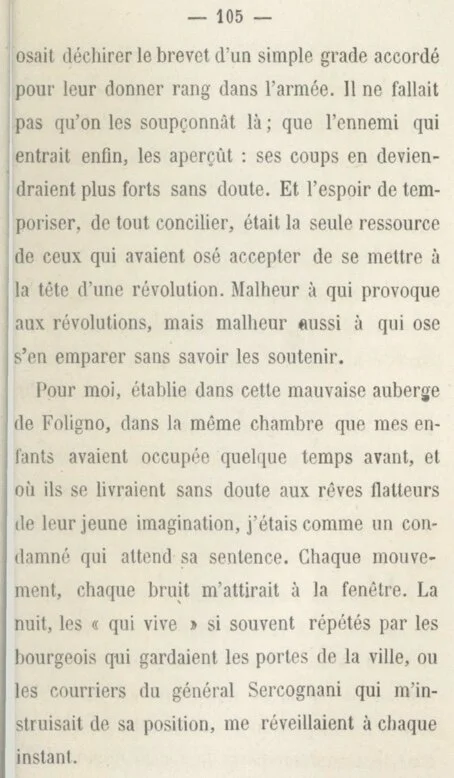This is the account of the intrigues that led to the death of Hortense Bonaparte’s much loved son, Napoleon Louis. The previous entries are here.
Hortense writes:
but he did not have a single howitzer to frighten a papal city enough, and make it open its doors.
The little ammunition we had had been kept for Ancona, a dismantled fortress that could not defend itself. He sent a letter to General Armandi, Minister of War, asking for these necessary howitzers.
I also wrote to my children to communicate to them all my fears for their cause, and to tell them that I was there to await the result; whatever it was, I wanted to know the route that the retreat would take.
These poor young people, who devoted their existence to service, who felt that in order to be anointed with honor one had to defend oneself with perseverance, chained to nullity by these circumstances, they saw authority without energy, losing everything in wanting to spare everything.
If my sons had gone forward to fight, their name, that name so beautiful and so terrible to the enemy, was an obstacle to them.
They were detained. They compromised to resign themselves to non-intervention.
We dared to tear up the mark of a simple honor granted to give them rank in the army. They shouldn't have been suspected there; let the enemy who finally entered perceive them: his blows would doubtless become stronger. And the hope of negotiating, of reconciling everything, was the only resource of those who had dared to agree to put themselves at the head of a revolution.
Woe to those who provoke revolutions, but woe also to those who dare to take one on without knowing how to support it.
For me, established in this bad inn of Foligno, in the same room that my children had occupied some time before, and where they undoubtedly indulged in the flattering dreams of their young imagination, I was like a condemned person who awaits their sentence. Each movement, each noise attracted me to the window.
At night, the "who lives" so often repeated by the citizen who guarded the city gates, or the couriers of General Sercognani who informed me of their position, woke me up at every moment.
…
C’est le récit des intrigues qui ont conduit à la mort du fils bien-aimé de Hortense Bonaparte, Napoléon Louis. Les entrées précédentes sont ici.



